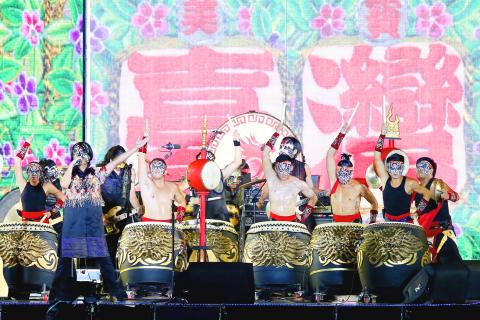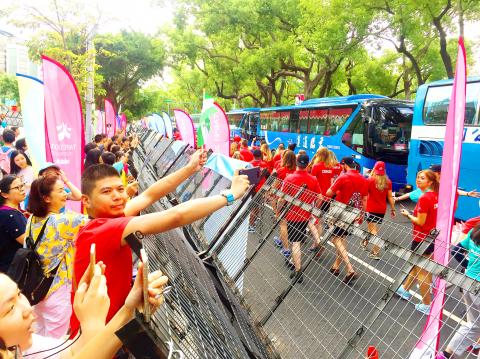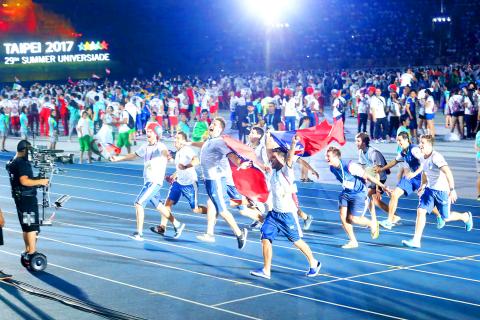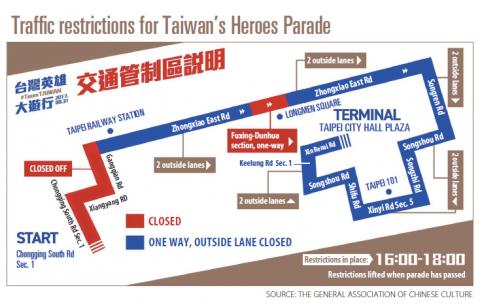The 12-day Taipei Summer Universiade yesterday ended with a festive closing ceremony at the Taipei Municipal Stadium featuring diverse cultural performances.
The ceremony showcased a modern mix of contemporary Taiwanese and international music, integrating local musical instruments with modern dance performances, as well as indie rock, pop, electronic and Aboriginal music.
As night fell, the prologue began at 6:30pm with “Indie Formosa” — 10 songs combining influences from Taiwanese, Hakka and Aboriginal cultures, performed by six groups with diverse music styles, one or two groups at a time.

Photo: CNA
The groups were Sibongie African Drumming and Dance Crew, indie rock band Zenkwun (神棍樂團), Paiwan pop singer Ah-bao (阿爆), the award-winning Sizhukong Jazz Band (絲竹空爵士樂團), rock band The Chairman (董事長) and Chio-Tian Folk Drums and Arts.
The ceremony officially began at 7:30pm with a rendition of the “Chinese Taipei” anthem and a fireworks display over the open stadium, followed by the spectacular entrance of each nation’s delegation — more than 100 flag bearers marching with athletes cheerfully entering behind them.
Athletes from around the world danced and played with audience members — handing out candy, taking photographs with them and making silly gestures — who cheered loudly for each national team, but stood and roared when Taiwan’s team entered.

Photo: CNA
A highlight of the ceremony was a cultural performance named “Taipei Loves You,” in which Aboriginal rhythm and blues singer Jiajia (家家) sang Over the Rainbow on an elevated stage, praising those who put hard work into making their dreams come true.
That was followed by performances by alternative rock band TRASH and pop-punk band Fire Ex (滅火器), who entered the stadium on a colorful ship, with the three artists taking to the stage to sing: “Taipei is filled with happiness, Taipei loves you! Let’s all clap hands together!”
“The people of Taipei were gracious hosts and enthusiastic supporters of top athletes and delegations from around the world ... Over the past 12 days, each competition was held to the highest standards and every athlete tested their limits,” Vice President Chen Chien-jen (陳建仁) said in a speech.

Photo: CNA
“We were honored to have you in Taiwan, a place where you left both tears and sweat,” Chen added.
“Finally, to everyone who has joined us here from all corners of the world, I hope you will have the chance to return to Taiwan,” Chen said. “The 23 million free, open and warm-hearted people of Taiwan welcome you back with open arms.”
Taipei Mayor Ko Wen-je (柯文哲), who served as chairman of the Taipei Universiade Organizing Committee, thanked the International University Sports Federation (FISU), the central and local governments, city government officials, professional advisers, athletes and the “passionate” audience and volunteers

Source: The General Association of Chinese Culture
“The end of the Taipei Universiade is a new beginning. This event has allowed us to befriend the world through sport, to be further integrated into the international community and to make the world see us as we are,” Ko said.
“On our island vessel — beautiful Formosa — we shall continue to sail the world as courageous, open-minded island-dwellers,” he added.
The FISU flag was then lowered, marking the end of the Taipei Universiade, and handed over to representatives of Naples, Italy, the host city for the next Summer Universiade in 2019.
With a powerful chorus of female voices chanting an Aboriginal song, the audience was encouraged to join hands and pray for world peace as the ceremony ended at about 10pm.
Outside the venue, the Taipei Police Department deployed about 6,000 police officers and raised security levels in a bid to avoid intentional disturbances and to maintain safety at the ceremony.
Tensions flared slightly when police asked protesters to move away from entrances or asked audience members to put away green Taiwan flags as they passed ticket check points, while security personnel closely followed groups of people wearing uniforms who resembled protest groups.

Taiwan is gearing up to celebrate the New Year at events across the country, headlined by the annual countdown and Taipei 101 fireworks display at midnight. Many of the events are to be livesteamed online. See below for lineups and links: Taipei Taipei’s New Year’s Party 2026 is to begin at 7pm and run until 1am, with the theme “Sailing to the Future.” South Korean girl group KARA is headlining the concert at Taipei City Hall Plaza, with additional performances by Amber An (安心亞), Nick Chou (周湯豪), hip-hop trio Nine One One (玖壹壹), Bii (畢書盡), girl group Genblue (幻藍小熊) and more. The festivities are to

Auckland rang in 2026 with a downtown fireworks display launched from New Zealand’s tallest structure, Sky Tower, making it the first major city to greet the new year at a celebration dampened by rain, while crowds in Taipei braved the elements to watch Taipei 101’s display. South Pacific countries are the first to bid farewell to 2025. Clocks struck midnight in Auckland, with a population of 1.7 million, 18 hours before the famous ball was to drop in New York’s Times Square. The five-minute display involved 3,500 fireworks launched from the 240m Sky Tower. Smaller community events were canceled across New Zealand’s

‘IRRESPONSIBLE’: Beijing’s constant disruption of the ‘status quo’ in the Taiwan Strait has damaged peace, stability and security in the Indo-Pacific region, MOFA said The Presidential Office yesterday condemned China’s launch of another military drill around Taiwan, saying such actions are a “unilateral provocation” that destabilizes regional peace and stability. China should immediately stop the irresponsible and provocative actions, Presidential Office spokeswoman Karen Kuo (郭雅慧) said, after the Chinese People’s Liberation Army (PLA) yesterday announced the start of a new round of joint exercises around Taiwan by the army, navy and air force, which it said were approaching “from different directions.” Code-named “Justice Mission 2025,” the exercises would be conducted in the Taiwan Strait and in areas north, southwest, southeast and east of Taiwan

UNDER WAY: The contract for advanced sensor systems would be fulfilled in Florida, and is expected to be completed by June 2031, the Pentagon said Lockheed Martin has been given a contract involving foreign military sales to Taiwan to meet what Washington calls “an urgent operational need” of Taiwan’s air force, the Pentagon said on Wednesday. The contract has a ceiling value of US$328.5 million, with US$157.3 million in foreign military sales funds obligated at the time of award, the Pentagon said in a statement. “This contract provides for the procurement and delivery of 55 Infrared Search and Track Legion Enhanced Sensor Pods, processors, pod containers and processor containers required to meet the urgent operational need of the Taiwan air force,” it said. The contract’s work would be